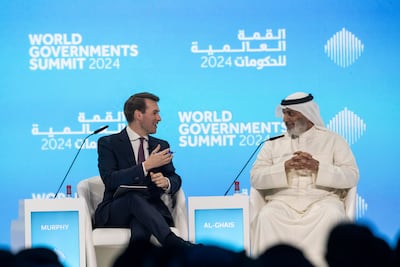The debate over peak oil demand was back in focus on Tuesday, with the head of the International Energy Agency saying that some oil and gas companies agreed with its prediction that global consumption would hit a plateau before 2030.
The rising share of solar and wind in electricity generation, growing electric vehicle sales and economic development in key emerging nations will lead to that conclusion, Fatih Birol told the IEA Energy Innovation Forum in Paris.
However, Opec secretary general Haitham Al Ghais told the World Governments Summit in Dubai on Tuesday that peak oil demand was “something way far out” but declined to provide a timeline.
It's not easy to definitively state when this peak would happen, whether it's “tomorrow, in five years, or in 10 years”, Mr Al Ghais said. “Nobody has a crystal ball.”
The Opec chief stated that the group bases its estimates on “raw data” and is not influenced by “ideological concepts”.
“We take the approach that all forms of energy will be required. No single source of energy will be able to replace another … oil today represents over 30 per cent of the global energy mix,” Mr Al Ghais said.
Opec and the IEA have been increasingly at odds regarding their differing assumptions concerning peak oil and scenarios for demand growth.

Last year, the group of oil-producing countries raised its long-term crude demand forecast to 116 million barrels per day by 2045, an increase of 6 million bpd from its previous estimate.
This year, Opec expects demand to grow by more than 2 million bpd, Mr Al Ghais said, adding that he was encouraged by upward gross domestic product estimate revisions in some countries.
“Although there are question marks … we still feel very robust about China, and we are seeing the Chinese government stepping in to take corrective measures,” Mr Al Ghais said.
“All of this with … [along with] the phenomenal economic growth we're seeing in India leads us to believe that we will have a strong economy this year with positive implications for oil demand.”
India, the world’s most populous nation, is expected to be the largest source of oil demand growth between now and 2030, according to the IEA.
Elections in focus
The transition towards cleaner forms of energy is already under way and is unlikely to be significantly altered by policy changes resulting from events like elections in some countries, energy officials said.
In Paris, Mr Birol reiterated the IEA’s forecast that global oil demand will hit a plateau before the end of this decade. adding: “I am very happy to see that several others, including some oil and gas companies, are agreeing with this statement.”
Clean energy and innovative technologies aimed at lowering carbon emissions are moving in the “right direction”, driven by industrial policies and falling costs, not environmental regulations alone, he said.
“What happens if one or two or three or five countries change this policy direction? Are we going to see a stop or slowdown or going back?” he said.
“My answer is absolutely not.”
Mr Birol also emphasised the need for innovation in existing clean energy technology.
“We are seeing some bright spots in technologies such as lithium-ion batteries,” he said.
“[However], if you ask us if innovation is going as fast as we would like to see, the answer is not necessarily.”
The IEA expects renewable energy to make up more than one third of total electricity generation by early 2025, overtaking coal.
The “massive expansion” in renewable energy such as solar, wind and electric vehicles is “not enough” to reach net-zero emissions by 2050, Mr Birol said, while urging countries to also back clean technologies that are still in a nascent phase.
More than 50 countries are going to the polls in the next 10 months for presidential and legislative elections.
Most notably, elections will be held in India and the US, the world's biggest economy.
In the US, former president Donald Trump is likely to win the Republican nomination for the White House. He has promised to prioritise boosting US oil and gas production if elected.
John Kerry, President Joe Biden's special envoy for climate, said the global marketplace had made its decision about the energy transition.
“No individual politician, no finance minister, no prime minister, no monarch can change the course the world is on. This transition has to happen,” Mr Kerry said at the IEA event.

He also took an aim at China’s continued use of coal despite being the fastest growing market for renewable energy.
If China, the world’s second-largest economy, successfully builds planned renewable energy projects and manages them using advanced technologies like artificial intelligence, it could significantly reduce the need for new coal-fired power plants, Mr Kerry said.
The rate of expansion of global renewable energy capacity surged by 50 per cent in 2023, with solar accounting for three-quarters of the growth, according to the IEA.
China recorded the largest growth, with wind power additions rising 65 per cent year-on-year. However, coal still makes up about 56 per cent of the country’s total energy consumption.
At the 2021 UN General Assembly, President Xi Jinping pledged that China would increase its support for low-carbon energy in developing countries, and not build new coal-fired power projects overseas.
On Tuesday, Mr Kerry called it a “step forward” but said enforcing China's commitment had “proven to be complicated”.
“We still [see] most of the coal-fired power coming online in South-east and East Asia,” he added.

